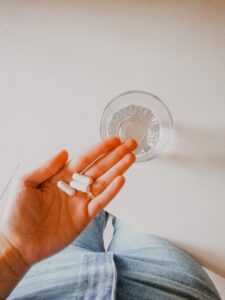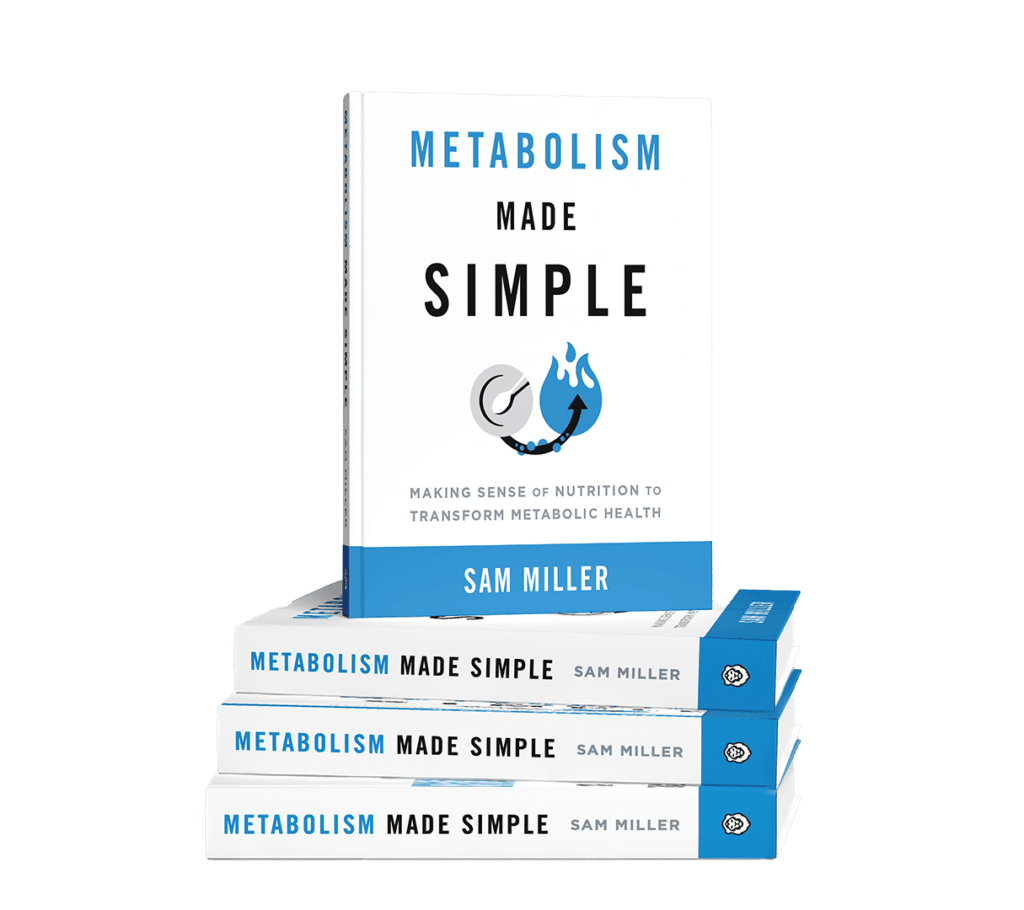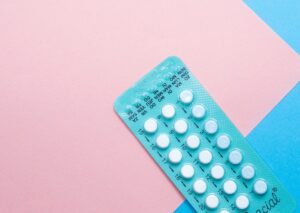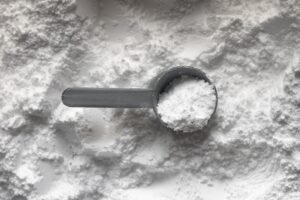Testosterone is perhaps the most well-known and most sought-after hormone in the male body.
Testosterone is commonly known as a prerequisite for strength, muscle mass, bone mass, fat distribution, and virility. Yet, over the past several decades, male testosterone levels have been steadily declining — more and more men have low testosterone.
Studies have shown that adult men are walking around with just fractions of the levels of our preceding generations (probably somewhere between ⅓ and ½ the testosterone level, to be precise), even just comparing the 20th century to today.
But what gives? We lift with purpose, and we eat according to our macros, yet somehow we pale in comparison to men from just a few decades prior.
Before we dive into the causes of low testosterone, or low T as some would call it, let’s cover some basics of the hormone.
And, if you’re interested in learning how you can use carbohydrates to increase testosterone levels, check out this blog post.
Table of Contents
What is Testosterone
Testosterone is a hormone that plays a crucial role in both men’s and women’s health.
Testosterone is an anabolic hormone, meaning it promotes the growth and development of muscle mass. It stimulates protein synthesis, which is essential for muscle repair and growth.
Higher testosterone levels are associated with increased muscle mass, strength, and overall athletic performance. Therefore, optimal testosterone levels can support muscle building and enhance physical performance during workouts.
Testosterone is also a key hormone that influences sexual desire in men. Adequate levels of testosterone are associated with a healthy and robust sex drive, and low testosterone levels can result in a decreased sex drive.
It is also a crucial aspect of sperm production. Men with low T might not have as many healthy sperm, which can impact their fertility.
How do You Know if You Have Low Testosterone
If you think you or your client may have low testosterone levels you can assess your symptoms and order a blood test to measure your testosterone levels.
One of the primary symptoms of low testosterone is a decrease in sexual drive or libido. You may notice a lack of interest in sexual activities that were once pleasurable or a decreased frequency of spontaneous erections.
Low testosterone can contribute to erectile dysfunction. If you’re experiencing persistent problems with erectile function, it’s essential to consider various potential causes, including low testosterone.
Symptoms of low testosterone can be seen from a fitness perspective as well. Testosterone is involved in the development and maintenance of muscle mass, and a significant decline in testosterone levels can lead to reduced muscle mass, reduced muscle strength, and difficulty in building or maintaining muscle.
Low testosterone can also contribute to increased body fat, particularly around the abdomen.
Why is Low Testosterone Bad
Low testosterone levels can have various negative effects on overall health and well-being.
Testosterone plays a crucial role in regulating sex drive and maintaining sexual function. Low testosterone can lead to a decrease in libido, erectile dysfunction, and reduced sexual satisfaction.
Testosterone is also involved in energy production and vitality. When an individual has low testosterone they might experience increased fatigue, decreased energy levels, and a lack of motivation. And because testosterone levels affect mood regulation, low levels of testosterone can contribute to mood swings, irritability, and an increased risk of developing depression.
Some research suggests a potential link between low testosterone and cognitive decline, including difficulties with memory, concentration, and cognitive processing speed. However, more studies are needed to fully understand this relationship.
Additionally, while low testosterone is not a direct cause of sleep apnea, there can be a connection between the two conditions. Sleep apnea is a sleep disorder characterized by repeated pauses in breathing or shallow breaths during sleep.
In some cases, low testosterone levels may be associated with an increased risk of developing sleep apnea or exacerbating existing sleep apnea symptoms. Additionally, sleep apnea itself can lead to low testosterone levels. Sleep disturbances and interrupted breathing patterns associated with sleep apnea can disrupt hormone production and regulation, potentially leading to low testosterone levels.
What Causes Low Testosterone Levels
There are several reasons why someone may be experiencing low testosterone levels, and looking at the factors that affect us today compared to what adult men experienced a couple of decades ago, there are a few glaring causes.
The good news is a lot of the causes of low testosterone are within your control and you can make lifestyle changes to get your testosterone levels within a normal range without having to resort to something like testosterone replacement therapy.
Stress Can Cause Low Testosterone
Anatomically speaking, we are the same human beings with the same production capacity as our ancestors, but what has changed as we live our daily lives is our environment and our nutrition, and so we now experience low testosterone compared to our ancestors.
Think of it this way — we are using the same out-of-date machinery (our bodies) but trying to process increasingly demanding modern-day problems or applications. You wouldn’t expect a 2002 Dell PC to do the work of a 2023 Macbook Pro, but that is what we ask our body to do every day in the 21st century.
With the rising demands of our environment, we face an increase in stress, which is matched by the release of cortisol, a stress hormone, and, in turn, low T.
Chronic stress, whether it be physical, emotional, chemical, or dietary stress, activates the sympathetic nervous system (your “fight or flight” response). When under chronic stress, the body is not focused on reproduction but on survival. As a result, the creation of reproductive hormones like testosterone is not a priority and gets placed on a back burner until stress is reduced.
Therefore, if you have low testosterone and want an edge in maximizing testosterone output, you must first manage cortisol.
If there is one thing you take away from this article, remember this: Cortisol and testosterone are inversely proportional. This means that as cortisol levels go up, testosterone levels normally go down. This happens because cortisol indirectly inhibits the production of testosterone in the testicles by inhibiting “steroidogenic acute regulatory protein.”
This science-y term for a complex protein (“STAR” for short) is responsible for regulating the transfer of cholesterol within your mitochondria which is the rate-limiting step in the production of your natural steroid hormones like testosterone.
In other words: Control cortisol and you have less interference with that cholesterol transfer and less inhibition of testosterone production, which means you’re one less step away from physical and mental badassery.
The good news is we can control cholesterol and cortisol through nutrition and lifestyle protocols to get those low T levels back to normal. Easier said than done, right? There are three primary ways to control cortisol:
1) Through parasympathetic activities,
2) Through nutritional intervention, and
3) Through managing circadian rhythm
What Activities Affect Testosterone?
Some top strategies to disengage your sympathetic (fight or flight) nervous system and engage your parasympathetic (rest and digest) nervous system are meditation, foam rolling, mobility drills, sleep, eating properly (per your dietary protocol), yoga, music, supplementing with adaptogenic herbs, and low-intensity outdoor activity (e.g., walking).
These recommendations assume you are already moderately active and engaging in some physically strenuous exercise such as resistance training 3–5 days per week. Multiple studies on testosterone levels have consistently shown increases in serum testosterone concentration following resistance exercise.
Your testosterone level is affected by a combination of factors, including the amount of muscle tissue mass you stimulate (think compound exercise), the volume of exercises you perform (sets x reps x load), and the intensity of exercise (both percentages of your 1-rep max and also the perceived intensity — think in terms of rated perceived exertion).
This is why coaching is so imperative, balancing these nervous system drivers properly through intelligent program design is exactly how you will help your clients achieve results throughout their fitness journey and help them get normal testosterone levels.
How Can Nutrition Help Manage Cortisol?
We can also reduce cortisol response through proper nutrition and peri-workout supplementation (European Journal of Applied Physiology, 2006). Insulin, the hormone secreted by your pancreas after a rise in blood sugar, also works in opposition to cortisol because it is called a “counter-regulatory hormone.”
For example, exercise reduces blood glucose, which is counter-regulated by increases in levels of epinephrine, norepinephrine, cortisol, and growth hormone. How much these hormones increase depends on how intensely and how long you exercise, and it is directly related to how quickly your muscles take in glucose.
If you are working out intensely you will likely be burning blood glucose and having a small cortisol spike during your workout. By timing the influx of insulin (ideally around your training sessions) you can further tilt the cortisol balance in your favor by opposing it with insulin, creating a more optimal environment for your body to produce testosterone.
A simple example of this would be having essential amino acids and cyclic dextrin during a workout followed by a whole food meal post-workout.
Additional supplements for the management of testosterone levels and cortisol include, but are not limited to, KSM 66 Ashwagandha, Longjack, DIM, and Fenugreek.
With most herbal formulations, you are working to indirectly raise your testosterone through either reducing aromatization (the conversion to estrogen), balancing cortisol, or improving free testosterone levels — meaning less of your testosterone would be bound in the blood to things like sex hormone binding globulin.
Can a Lack of Sleep Cause Low Testosterone?
The phrase “circadian rhythm” is a complicated way of saying your biological clock or daily schedule. If a person’s sleep pattern has been disrupted for some time, then resetting this rhythm can have a profound impact on hormonal output and result in low testosterone.
Even partial sleep reduction lasting one week at 5 hours per night has been shown to decrease overall testosterone production by 15% in healthy young men. Another study revealed that men who slept for 4 hours per night had an average of 200–400 ng/dl testosterone levels, which was lower than men who slept 8 hours per night and had closer to 500–700 ng/dl.
In a study of Chinese males, researchers calculated that an extra hour of sleep led to about 15% higher testosterone production.
The main takeaway here is to shoot for 8 hours of sleep and maintain adherence to a similar sleep/wake schedule throughout the week. And this doesn’t just go for people with low testosterone. Everyone should aim to get adequate sleep, not just for their hormonal health but for overall health.
How Does Cholesterol Impact Testosterone?
The importance of cholesterol for men with low testosterone cannot be understated.
From a non-science perspective, think of the testosterone production process as a pyramid where each level is dependent on the prior level’s foundation. Testosterone comes from pregnenolone and pregnenolone is made from cholesterol.
On a molecular level, cholesterol is the precursor of the five major classes of steroid hormones because, without it, we cannot make pregnenolone, also known as the “mother hormone.” Cholesterol starts off in the body as a large molecule with essentially 27 units. The first stage in the synthesis of steroid hormones is the removal of 6 of those units of the cholesterol molecule to form pregnenolone (a hormonal precursor to testosterone).
After we have pregnenolone the body can make an intermediary hormone that allows us to begin creating androgens like testosterone. Without this middle link, we lack the structural foundation for our testosterone on a molecular level.
This is further evidenced by researchers who compared the dietary records and blood tests of 12 men with at least one year of weight training. The researchers found significant correlations between testosterone levels and total and saturated fat intake, so be mindful of getting a balanced ratio of monounsaturated, saturated, and polyunsaturated fats.
We can get healthy fats and cholesterol precursors in the diet through whole eggs(preferably free range), grass-fed butter, oils, and lean red meats (grass-fed is best if you can get it).
How to Increase Testosterone Levels
While testosterone is characterized by strength and indestructibility it is possibly one of the body’s least resilient hormones.
Simple changes in sleep, nutrition, and stress levels can have a significant impact on your hormonal output and lead to low testosterone. We were designed for survival, not to maintain “cover-model-esque muscle” year-round.
Fortunately, many of the factors that cause low testosterone are within our control, and treating low testosterone may not require you to turn to extremes. The next time you are looking to supercharge your system, remember that natural cortisol control and cholesterol may just be the best testosterone boosters there are.
If you are looking to optimize your natural testosterone levels, don’t turn to testosterone supplementation, implement these five key points in your regimen instead:
- Strive for 8+ hours of sleep per night with a similar sleep/wake schedule for a healthy circadian rhythm
- Prioritize peri-workout nutrition
- Consider implementing adaptogenic herbs like Ashwagandha
- Eat your healthy fats and dietary cholesterol
- Manage your stress levels!
References
Yeap, B.B., Flicker, L. Testosterone, cognitive decline and dementia in ageing men. Rev Endocr Metab Disord 23, 1243–1257 (2022). https://doi.org/10.1007/s11154-022-09728-7

















